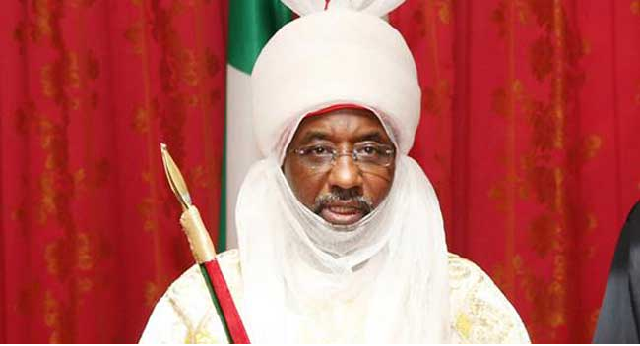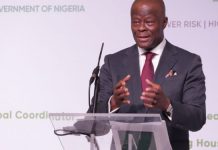The Emir of Kano, Muhammadu Sanusi II, was removed from his position on Monday after a long-running row with the state government.
The Secretary to the State Government, Usman Alhaji while making the announcement on Monday said the removal was in line with the recommendation of the Kano State Public Complaint and Anti-Corruption Commission.
The state government also stated that the dethronement was part of its move to safeguard the “sanctity, culture, tradition, religion and prestige” of the Kano State Emirate which was established over a millennium ago.
Sanusi was also accused by the state government of disrespecting lawful instructions.
While the news of his dethronement continues to generate buzz all over the media and might stir debates in various quarters, there are certain things about the now exiled emir which many should know, as these things aid to shape a full narrative about his person.
Below are seven things you should know about the former Emir of Kano, Muhammadu Sanusi II.
1. Outspoken and fearless
Muhammadu Sanusi was an outspoken and fearless monarch but did not begin to show these traits only upon the accession of the throne. Prior to his becoming Emir of Kano, Sanusi was known for speaking passionately about issues regarding the polity and economy of Nigeria.
Sanusi as a traditional ruler was not shy to delve into the politics of the day, he accused political and religious leaders in the north of not doing enough for the region, adding that the lackadaisical approach to governance within the region was a major contributing factor to the widening of the poverty gap between the mainly Muslim north and the majority-Christian south.
2. A chip off the old block
Lamido Sanusi ascended the throne in 2014, taking over from his granduncle Ado Bayero. His grandfather, Muhammadu Sanusi I, was the 11th Emir of Kano from 1953 until 1963.
Like in his own case in 2020, Sanusi’s grandfather was deposed by his cousin Sir Ahmadu Bello. The reason for the dethronement was also similar, Sanusi like his granddad was accused of insubordination.
3. An erudite scholar and banking guru
Born into a ruling class, son of a career diplomat who served as the Nigerian Ambassador to Belgium, China, and Canada, Sanusi went on to establish himself as an indispensable asset in the Nigeria banking and finance industry, rising from management roles in different banks to becoming the CEO of First Bank, one of Africa’s largest financial institutions.
After his education at the King’s College in Lagos, where he graduated in 1977, Sanusi proceeded to Ahmadu Bello University in Zaria, where he received a bachelor’s degree in economics in 1981. He later received a master’s degree in economics two years later from the university and lectured at the faculty.
With his performance academically and his growth within the banking industry, it was no surprise when On the first of June 2009, Sanusi was nominated as governor of the Central Bank of Nigeria by President Umaru Musa Yar’Adua.
4. Modern reformer
During his earlier role as central bank chief, Sanusi earned a reputation as a straight-talking modern-reformer, who was not afraid to speak out against corruption, even though there were some charges of graft against him, allegations which he denied.
Sanusi initiated several extensive banking reforms that were built around “enhancing the quality of banks, establishing financial stability, enabling healthy financial sector evolution and ensuring that the financial sector contributes to the real economy”.
He is credited with leading the central bank in rescuing top tier banks with N400 billion of public money and dismissed their chief executives. He also introduced a consolidation process which reduced the number of Nigerian banks through merger and acquisitions, in a bid to make them stronger and more accountable to depositors.
5. Suspended whistleblower
In 2014 Sanusi was suspended as CBN governor by President Goodluck Jonathan.
The suspension came after the former CBN Governor accused the state-run Nigerian National Petroleum Corporation (NNPC) of not remitting some $20 billion to state coffers.
Sanusi had written to Jonathan detailing that the NNPC had not remitted over $49.8 billion proceeds of crude oil sales. The NNPC responded that no money was missing thus leading to the constitution of a reconciliation committee whose findings were debated.
Unsatisfied with the reconciliation process, Sanusi brought the matter to the attention of the Senate. a forensic audit was carried out by PwC and the result poked holes in the arguments put up by the NNPC and the Ministry of petroleum, but no one else bore the brunt than the whistleblower himself.
6. Controversial ascension
There are some who believe that Sanusi’s willingness to become Emir of Kano was politically-motivated.
Those who champion this thought, say Sanusi accepted the appointment of the throne in a bid to avoid fraud charges from his tenure at the Central Bank.
For some, the rightful heir to the throne was his cousin, and to this effect, some protested saying Sanusi was not the right one to ascend the throne.
Sanusi, however, was crowned Emir Muhammadu Sanusi II on 9 June 2014, as he became the Emir of Kano, he automatically became a leader of the Tijaniyya Sufi order, the second-most-important Muslim position in Nigeria after the Sultan of Sokoto, leader of the larger Qadiriyya Sufi order.
7. Perceived as a dissident
During his time as Emir of Kano, many saw Sanusi as a dissident to Northern norms.
He received many criticisms from conservatives in the North, for making several comments on socio-political issues impacting the region.
Some of those comments that earned him criticisms include the calls for an end to child marriage, building more schools instead of mosques, and infrastructural development.
He also called for population planning and said that polygamy is increasing poverty in the region.
Also part of his calls were certain solutions proffered to solving the almajiri issue.
In November 2014, after Sanusi urged his followers to fight Boko Haram, the Great Mosque of Kano was bombed, with over 150 killed.
Abubakar Shekau, the leader of the insurgent group Boko Haram, accused Sanusi of deviating from Islam and threatened his life; Sanusi replied that he is “safe with Allah”, and likened Shekau’s extremist comments (describing Sufis as unbelievers) to those of the heretical Islamic preacher Maitatsine.
While on the throne of the Kano Emirate, Sanusi spoke out on government policies, breaking with royal tradition. He criticized the state government of misplaced priorities and it is believed that this stirred the investigation into corrupt practices within the Emirate.
Though the investigation was later called off by the state legislature following intervention by the ruling class, the government headed by Ganduje went on to create a law that saw to the rise of four new Emirates, thereby receding the powers of Sanusi.
Source: Channels TV













